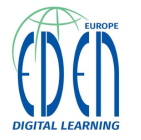Contribution to the EDEN President’s Blog by Morten Flate Paulsen, NKI Distance Education
I recently spent two days in the picturesque Norwegian town of
Understandably, inmates have limited access to the Internet. But there are technical solutions secure enough to provide inmates, even in high security prisons, access to the web. These solutions are basically based on gateways that:
- only allow access to whitelisted domains
- accept inbound information, but reject outbound messages
- provides detailed log files of all traffic
Working at NKI Distance Education, I’m pleased to understand that inmates for decades have followed our correspondence courses and that several low security prisons now allow them to study our online courses. Some telephone calls, certain addresses, and special examination arrangements points to prisons, but as far as I know, NKI doesn’t have, and probably shouldn’t have, any statistics or systematic information about the extent and outcome of its prison education.
Generally, the challenges in European prison education are dire and tough. There is a broad range of individual needs that are handled with limited resources. Many inmates are drop-outs with distressing school experiences. Security, learning disabilities and foreign language issues are demanding. But The European Convention on Human Rights states in Article 2 that, “No person shall be denied the right to education”. So, in my quest to learn more about these issues, I found comfort in the thirteen recommendations on education in prisons provided by the European Council. They are all listed at a web site for the European Prison Education Association.
I also found two relevant European projects. The objective of the Pipline project was to improve prison education in
My conclusion is that online education has a potential to improve prison education significantly. First of all, it may increase the range of available courses dramatically. Secondly, it makes it much easier to stay the course in spite of the frequent relocations that are common in prisons. Finally, it may help prisoners continue and complete courses after they are released.





